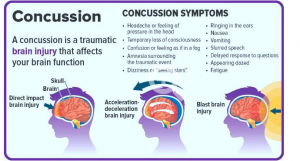
Often when an individual experiences some sort of head trauma and receives a concussion from it they are told not to sleep. However, is this a true thing that we should not do? This idea of not sleeping after a concussion is a myth. In specific occasions this is important though. During a severe concussion that results in medical attention a medical care provider may want you to stay awake so that they can monitor symptoms that may occur after the fact. Symptoms that are not able to be monitored during sleep include dilated pupils to even slipping into a coma and/or death.
What are some symptoms an individual may experience after a concussion?
Individuals who experienced a concussion may have difficulty falling asleep or staying asleep. This results in altered sleep patterns during recovery. Prolonged and/or persistent sleep disturbances can affect the quality of life and result in other symptoms like depression, anxiety, and apathy.
Individuals with a concussion who have indicated difficulty falling asleep or staying asleep take 3-4 times longer to recover from the concussion vs. those who don’t experience these issues falling asleep. This could be a result of the brain not having adequate time to heal while the individual is asleep.
What are the benefits of sleeping after a concussion?
Sleep is beneficial after a concussion (given the individual is not experiencing symptoms that require medical attention). Proper sleep during recovery heals and resorts electrochemical balances in the brain. So, what exactly is it healing?
A team of Switzerland researchers found that restless deep sleep resulted in a visibly reduced learning efficiency. When an individual is awake synapses in the brain facilitate the passing of electrical impulse from one neuron to another. But during sleep, the activity of these synapses goes back to normal. Without this restorative period, they stay excited at their peak activity for too long. This interferes with the brain’s neuroplasticity. Neuroplasticity enables the brain to learn new skills, change and adapt to its environment stimuli, and ultimately learn new things.
Sleep can also alleviate the severity of symptoms like headaches and improves neurocognitive processes. After seeing that sleep aids in neuroplasticity, it makes sense to think that while sleeping different neurotransmitters are moving around the brain working and healing damaged areas that need to be fixed.
Is there a treatment that aids in sleep disturbance?
A treatment that has been shown to help with this is melatonin.
Individuals who experience sleep disturbances experienced greater help falling asleep and staying asleep with the use of melatonin. An individual with a concussion related to non-sport related concussion is more likely to have sleep disturbances compared to individuals with a sport-related concussion. This comes from the idea that a sport-related concussion is more severe and that there may be other factors such as post-traumatic stress.
Sleep is important for recovery of a concussion, but an individual may experience disturbances related to falling asleep and/or staying asleep. Therefore, quality of life regarding mental health is just as important to monitor during recovery time.